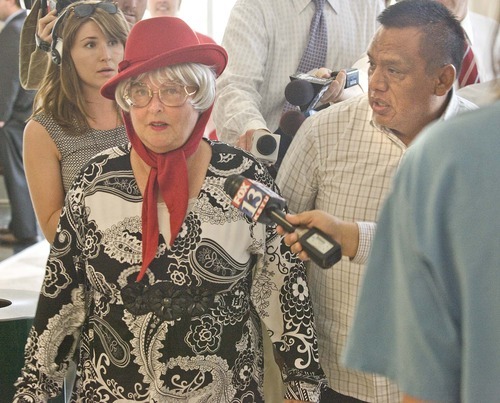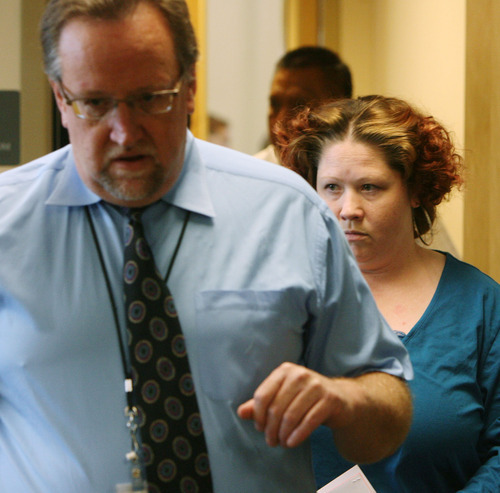This is an archived article that was published on sltrib.com in 2011, and information in the article may be outdated. It is provided only for personal research purposes and may not be reprinted.
Blaine and Norma Malquist used to keep a big, organic garden at their Nephi home. They grew veggies like carrots, squash, radishes and pumpkin, and they harvested fruits, including cherries, apples, peaches and apricots — all of it pesticide-free.
Or at least that's what they thought.
Then they found out last summer about Juab County's mosquito abatement program and realized their organic garden — along with their yard and their neighbors' — was being fogged as often as twice a week in summer with Kontrol 4-4, an insecticide. They say they also traced family health problems to the spraying.
Now, as mosquito spraying gets under way throughout Utah, the Malquists have put the county on notice that they intend to sue over the anti-mosquito program.
"We feel it does damage to people's bodies and to the environment," said Blaine Malquist, who feels the spraying violates his property rights. "It's not a good way to [control mosquitoes] to spread this poison all over."
Their attorney, Randall K. Spencer, says the family is prepared to seek an injunction, if necessary, to stop the spraying.
Juab County Attorney Jared Eldridge said the county has been looking at the Malquists' claim. But there are no plans to stop spraying because the county has a responsibility to address the public health concerns presented by mosquitoes, including the deadly West Nile virus.
"The county has made every effort to address Mr. Malquist's concerns," Eldridge said. "I don't know what more the county can do."
The controversy in Juab County could be happening in virtually every populated area of the state.
There are 21 mosquito-control organizations in Utah, and many use Kontrol 4-4. It is considered "one of the safest products on the market" with an active ingredient that is man-made but mimics a natural pesticide in chrysanthemums, said Clark Burgess, director of the state's pesticide-safety office.
"Most of us are not going to see any negative impacts at all," said Randolph Sessions, executive director of the Utah Mosquito Abatement Association, a professional organization that offers training and support for the local abatement districts.
He noted the benefits of anti-mosquito programs — getting rid of the annoying and sometimes dangerous pests. He cited mosquito-borne West Nile virus as an example.
According to the Utah Department of Health, the virus has been blamed for just one confirmed case of West Nile in Juab County — and no deaths — since a tally began in 2003.
"That's a result," said Sessions, "of good mosquito control."
He said people do complain sometimes, and mosquito-control districts try to address those concerns by sometimes creating no-spray zones.
"Right next door, there might be people who do want to be sprayed because they don't want the mosquitoes," Sessions said. "Life without some kind of mosquito control in Utah would be pretty miserable."
Spencer, the Malquists' attorney, said the bottom line for his clients is to prevent further spraying.
Before enlisting his aid, the Nephi family met repeatedly with county officials. Their daughter is sensitive to chemicals and has allergies that, like their own health issues, seem to get worse when the spraying is happening, they said.
They allege in their claim that the county fails to notify residents about "fogging," which sometimes happens when the wind speed is 10 mph or faster, and that spraying sometimes takes place during times when children are still outside playing.
Also, their claim says, the county fails to inform the public about vital safety information about what to do when the pesticide gets on skin: rinse for 15-20 minutes. The county employees who do the fogging also use far more pesticide than necessary, the claim says.
These are violations of state and federal law, said Spencer. He noted that the county officially has until mid-July to respond to the Malquists' request even though the mosquito season is now under way.
"The Malquists are not out to make gobs of money on this," he said. "They just want the county to stop spraying. If [county officials] do not agree to do that, then we will fight it out in court."
What are the symptoms of West Nile Virus?
Most people will not even know they are infected.
About 20 percent of infected people develop flu-like symptoms. This is called West Nile fever. These people may have a fever, body aches, and possibly a rash.
Of those who become infected, 1 in 150 will go on to have the more severe form of the disease. They may have a stiff neck and muscle weakness, and they may become confused or disoriented. Such people may have seizures, go into a coma, and, on rare occasions, may die. People over the age of 50 are at highest risk of getting the severe infection.
Source: Utah Department of Health —
Mosquito programs getting under way statewide
Utah's mosquito-control programs normally begin months before mosquitoes become a problem, usually in May. In March and April, abatement districts look for signs of mosquitoes in standing water and other places that are favorite breeding grounds. Fogging usually begins when adults become active. Utah's 21 anti-mosquito programs — including three in Salt Lake County — use insecticides approved for use in residential areas by the U.S. Environmental Protection Agency. This season's spraying is just beginning now, about three weeks later than most years, because of unusually cold weather. Anyone with more questions or concerns about mosquito abatement in his or her area can call the local district.
Source: Utah Mosquito Abatement Association





